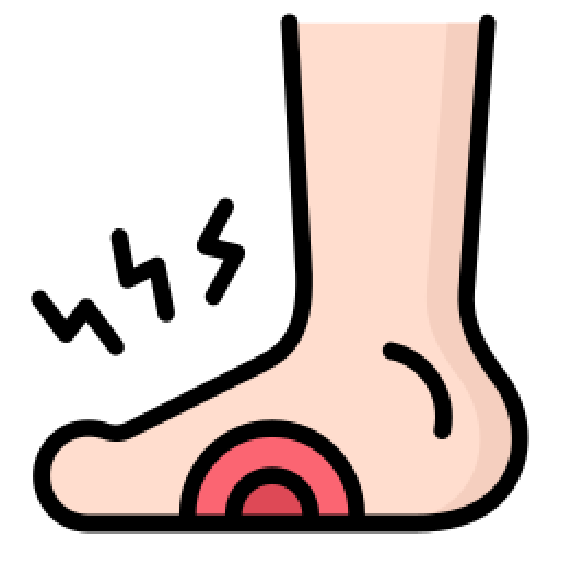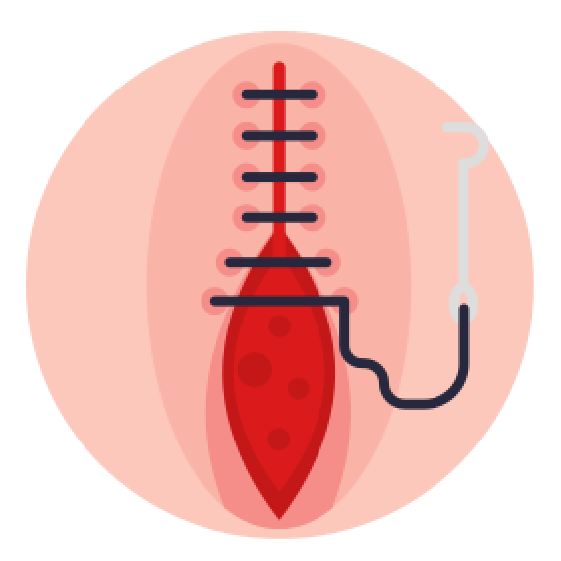Prioritized Care For All
Different Types Wound
Specialized wound care centers for better, faster healing. Chronic wounds and burns from trauma, surgery, infections, diabetes, and more.
Professional Support
Wounds

Chronic Wound
A wound, whether acute (caused by an injury) or chronic (persistent), goes through a typical healing process involving stages of hemostasis, inflammation, proliferation, and remodeling.

Diabetic Ulcers
Diabetic ulcers, most commonly found on the feet, are open sores or wounds. They occur primarily due to poor circulation, neuropathy (nerve damage), and increased pressure on certain foot areas.

Venous Ulcers
Venous ulcers, a complication of venous insufficiency, have a notable impact on an individual’s quality of life. As these wounds can be notoriously hard to heal, understanding their origin and treatment is essential.

Pressure Wounds
Pressure wounds are injuries to the skin and underlying tissue caused by prolonged pressure on specific areas of the body. Understanding their cause, prevention, and management is crucial for maintaining skin health.
our Services
Understanding Wound Types and Care

Chronic Wound
A surgical wound, also called an incision, is a deliberate skin cut created during a surgical procedure. Treatment for a surgical wound varies based on its location, typically involving regular dressing changes, cleaning the skin around it with soap and salt water, and irrigating the wound using a saltwater-filled syringe.
Chronic wounds can be characterized as wounds that do not progress through the typical stages of wound healing in a systematic and timely manner. Frequently, these wounds become stuck during the inflammation phase of the healing process. Chronic wounds can result from diabetes, vascular diseases, and infections. Healthcare professionals treat chronic wounds by removing dead, damaged, or infected tissues, using antibiotic dressings, and adding gel or ointments to keep the wound clean and moist.
Diabetic Ulcers
Slow or Non-Healing Wounds: These types of wounds require an extended time to exhibit signs of improvement or do not heal completely. They can be caused by underlying medical conditions such as peripheral artery disease, malnutrition, or infection. Treatments would include biopsies, cryotherapy, nutritional support, and advanced dressings.
Pressure Wounds: These wounds are developed by prolonged pressure on the skin, occurring on the bony areas such as elbows, heels, and buttocks. Pressure wounds typically arise in individuals who spend most of their time sitting in one position, such as patients in wheelchairs. Therefore, it is essential to change position and move frequently to alleviate pressure on the ulcers and prevent the formation of new ones. Other treatments include specially designed mattresses, appropriate dressings, or adding gels and ointments on the wounds.


Venous Ulcers
Venous ulcers are sores on the skin that happen because blood doesn’t flow well in the legs. They’re mainly linked to issues with the veins, causing damage to the skin and tissues in the legs. Unlike cuts from surgery that usually heal in a certain way, these ulcers are tricky. They get stuck in the first phase of healing, causing them to be long-lasting wounds. To treat venous ulcers, doctors and specialists have to work on fixing the blood flow in the legs and also on healing the ulcers. They use things like tight bandages or stockings to help blood move better and reduce swelling. Also, they clean the wound regularly and remove any dead or bad tissue.
Special coverings are used to keep the wound a bit wet, which helps the body heal. Antibiotics are used to fight any infections. It’s also important to take care of other health problems, like diabetes or issues with blood vessels, to help the ulcers heal better. The main goal is to help these ulcers heal by taking care of the wound and fixing the blood flow problem. By doing a bunch of things together, doctors try to make the ulcers go away and help the skin and tissues in the legs get better.
Pressure Wounds
Pressure wounds, also known as pressure ulcers or bedsores, are injuries that occur when there’s long-lasting pressure on the skin. They typically develop in areas where bones are close to the skin, like heels, hips, or the tailbone. These wounds differ from surgical cuts because they happen due to prolonged pressure, often when someone is in the same position for a long time, such as in a wheelchair or bed. Treating pressure wounds involves various steps to help the skin heal and prevent further damage. Healthcare professionals need to relieve the pressure by regularly changing the person’s position. This helps to reduce the stress on the affected skin areas. They also use special cushions or mattresses to ease pressure and help the wounds heal.
Keeping the wound clean is crucial. Dressings are used to cover the sore and protect it from getting infected. Removing dead or damaged tissue through a process called debridement helps the healing process too. Antibiotic treatments might be used to fight off any infections that could slow down the healing. It’s important to make sure the person gets good nutrition and stays hydrated. This helps the body to repair and grow new skin. Sometimes, healthcare providers use ointments or gels to maintain moisture in the wound, as it can help with healing.

How We can help
Understanding Wound Types and Care
If you’re seeking professional wound care, we’re here to assist you in finding the nearest center with prompt appointments available. Our affiliated care teams comprise board-certified physicians, skilled surgeons, wound-care-certified nurses, and supportive clinical staff, including dietitians, diabetes educators, and physical therapists. We understand the urgency of treating wounds and are committed to helping you start your journey to recovery. Contact us to discuss your needs, and we will match you with a specialized care center that’s ready to serve you. Let us help you heal quicker by connecting you with top-notch wound care professionals. Reach out to us, and take the crucial step towards effective wound healing with the best care possible. Your health and comfort are our top priorities, so let’s find the perfect appointment for you today.
More Information
Wound Care and Wound Care Centers
Wound care is the specialized medical treatment and management of wounds, focusing on promoting healing, reducing the risk of infection, and enhancing a patient’s quality of life. Wound care centers, often referred to as wound clinics, are dedicated healthcare facilities that address both acute and chronic wounds. These centers employ a multidisciplinary team of professionals, including doctors and nurses, to diagnose, treat, and manage wounds that do not heal as expected. The interventions at these centers can range from basic wound cleaning and dressing to advanced therapies like hyperbaric oxygen treatment or skin grafts. Given the complexities associated with non-healing wounds, seeking expertise from these specialized centers is crucial to prevent severe complications.
How do I know if my wound is infected?
Symptoms of an infected wound may include increased pain, swelling, redness, foul odor, or a yellowish liquid (pus) oozing from the wound. If you suspect an infection, consult a healthcare provider.
What types of dressings are used in wound care?
There are various wound dressings available, including gauze, hydrocolloids, foam dressings, alginate dressings, and more. The choice depends on the type, size, and location of the wound, as well as the amount of exudate (wound fluid).
How can I prevent pressure wounds if I'm bedridden or have limited mobility?
Regularly changing positions, using pressure-relieving devices like specialty mattresses or cushions, maintaining skin moisture (but avoiding excessive moisture), and frequent skin inspections are crucial preventive measures.
How often should a wound be cleaned?
It’s crucial to clean a wound initially to prevent infection. After that, depending on the type of wound and the dressing used, it may need cleaning at each dressing change or just when visibly dirty. Always follow the advice of a healthcare professional.
